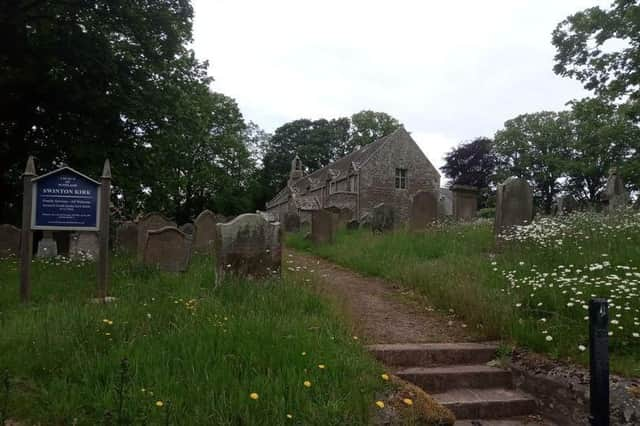Scarred human remains found at village church


During work in the graveyard of Swinton Parish Church, archaeology contractors Borders Reivers Archaeology Unit recovered remains which show evidence of multiple injuries from around the time of death.
The disturbed human remains, recovered from the earth along the route of a cable, include 124 bone fragments and two loose teeth. The bones, it is thought, accounted for five individuals – two adults and three children or teenagers.
Advertisement
Hide AdAdvertisement
Hide AdTwo sections of lower leg bone reveal blade wounds inflicted around the time of death. Another leg bone has three separate sharp force trauma cuts. These are thought to have been made with an axe or sword. Another leg bone has been severed in a similar way.
The story of the people who inhabited the borderlands is tempestuous and brutal. By the dawn of the 16th century, most of the folk who inhabited the area knew nothing other than bloody conflict and the constant battle for survival.
Swinton Parish Church, known as Swinton Kirk, was built in stone after 1100 and significantly altered in 1593, with further repairs taking place in the 18th, 19th and 20th centuries.
The kirk is thought to have been used as a place of refuge during the border raids which took place in the Anglo-Scottish wars and during the time of the Border Reivers, which lasted from the late 13th century to the 17th century when King James I finally dealt with the lawless region.
Advertisement
Hide AdAdvertisement
Hide AdThe village was attacked by invading English forces at least four times in the century before the 1593 alterations to the kirk.
A bank in the kirkyard was possibly a defensive earthwork around the church.
A spokesperson for Borders Reivers Archaeology Unit said: “We can be sure the church bell, known as the Flodden Bell, rang the death knell after the crushing defeat of the Scottish army at the Battle of Flodden, only nine miles away in Northumberland in 1513.”
The bell is inscribed with the date it was cast in the Low Countries, 1499.